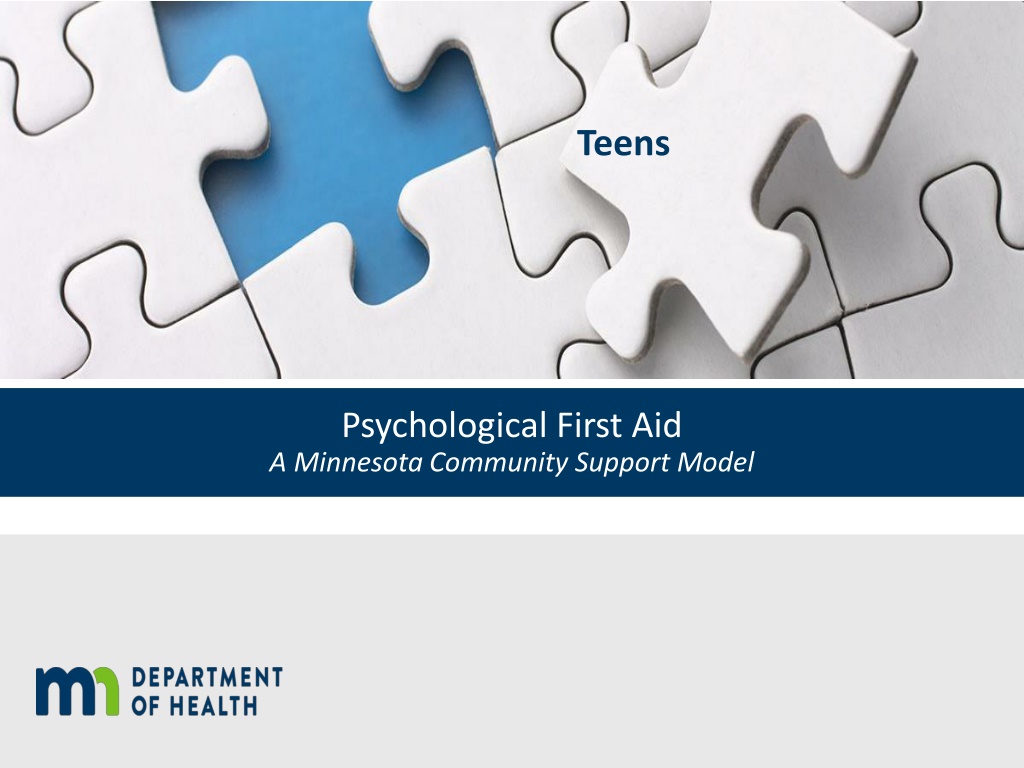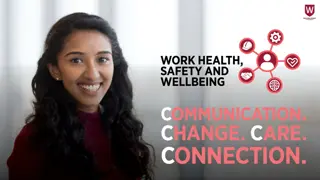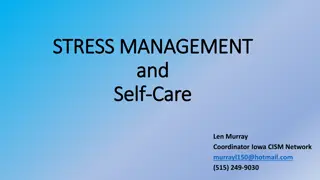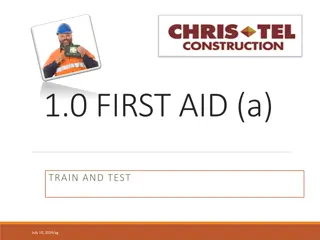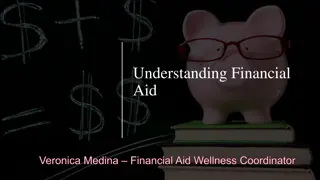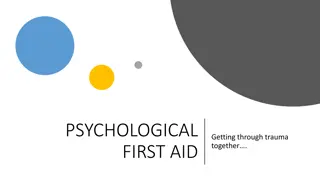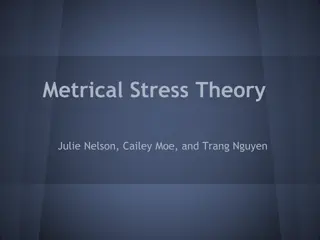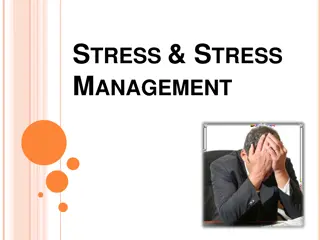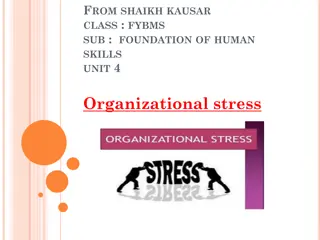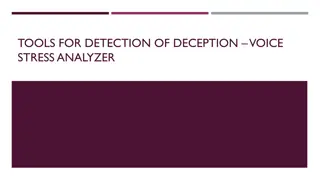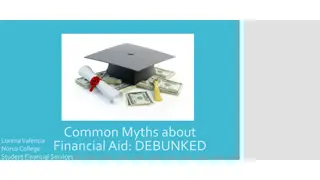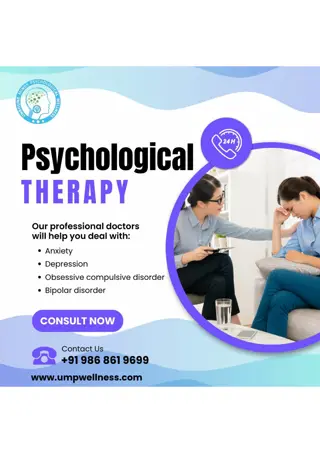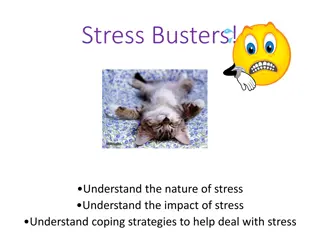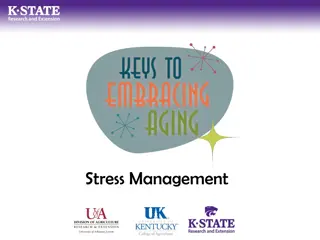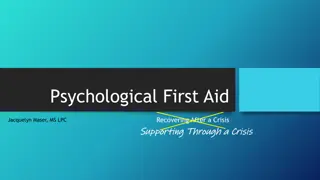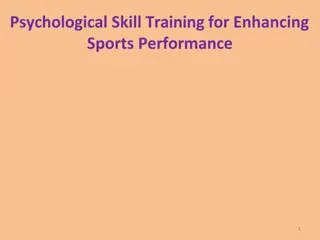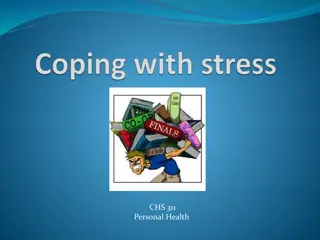Understanding Psychological First Aid and Stress Management for Teens
Learn the importance of Psychological First Aid (PFA) in managing stress, the effects of stress on the mind and body, and how stress triggers the brain's response mechanisms. Discover common physical reactions to stress and how to identify and cope with them effectively. Explore the psychological and behavioral impacts of stress, as well as the Fight, Flight, or Freeze response to threatening situations. Adapted from the Minnesota Community Support Model.
Download Presentation

Please find below an Image/Link to download the presentation.
The content on the website is provided AS IS for your information and personal use only. It may not be sold, licensed, or shared on other websites without obtaining consent from the author. Download presentation by click this link. If you encounter any issues during the download, it is possible that the publisher has removed the file from their server.
E N D
Presentation Transcript
Teens Psychological First Aid A Minnesota Community Support Model
Why Should You Learn Psychological First Aid (PFA)? Helps you to understand stress, and what it does to your mind and body Gives you simple tools to help yourself, your friends, and your family. It can be used anytime, anywhere. Uses skills you probably already have 2
What is Stress? Stress is the effect of anything in life to which people must adjust. Anything we consider difficult causes stress, even if it is something we want to do. The key is that stress forces us to make adjustments (changes) to our thoughts and behavior while at the same time making demands upon our mind & body s energy. Adapted from the international Red Cross Red Crescent Society 3
Psychosocial Stress Response Fear and Distress Response Impact of Event Behavior Change Psychiatric Illness Adapted from: Source: Butler AS, Panzer AM, Goldfrank LR, Institute of Medicine Committee on Responding to the Psychological Consequences of Terrorism Board of on Neuroscience and Behavioral Health. Preparing for the psychological consequences of terrorism: A public health approach. Washington, D.C.: National Academies Press, 2003. 4
How Stress Works on Your Body Under extreme stress your frontal lobe turns off, and your limbic system (cave man brain) turns on. 5
Threat & the Stress Response The Stress Response occurs Every Time our brain and body feel threatened Just thinking about something stressful can turn on the Stress Response When turned ON our brain starts to release over 1,400 chemicals and 30 different hormones that flood our whole body and help us in an emergency. Adapted from: The Center for Mind-Body Medicine, Debra Kaplan, Lora Matz 6
Fight, Flight, or Freeze Unseen Seen/Felt Pupils dilate Mouth goes dry Muscles tense Heart pumps faster Breathing becomes fast and shallow Brain gets body ready to act by: Releasing adrenaline Blood pressure rises Liver releases glucose for muscle energy Digestion slows 7
Common Physical Reactions Teens Sleep problems Constipation/diarrhea Stomach upset, nausea Headaches Rash/Acne Muscle aches/stiffness Sweaty palms Feeling out of control of your own body 8
Common Emotional Reactions Teen Fear or Anxiety Sadness or Tearfulness Anger or Irritability Feelings of inadequacy or worthlessness Feeling of guilt Loss of sense of Safety Numb, withdrawn Lack of enjoyment in favorite activities Feelings of emptiness or hopelessness 9
Common Behavioral Reactions Teens Impulsive behaviors Unsafe sex Alcohol/Drugs Aggressive behaviors Bullying Arguments with friends and family Isolation/avoidance Places, activities, or people that bring back memories 10
Common Cognitive Reactions Teens Difficulty concentrating, feeling spacey Difficulty with remembering things Not able to forget about it (Intrusive Memories) Day dreaming Recurring dreams, nightmares Feeling on edge/watching out for danger 11
Common Sensory Reactions Teens Sight Sound Smell Taste Touch 12
Common Spiritual Reactions Teens Comfort in our faith community Moving closer to our beliefs Moving away from our belief system Anger at what we see as an injustice Developing a new viewpoint of the world 13
What Helps Us Deal with Stress? Being able to look at what happened Without blame to self or others Understanding our stress reactions Feeling like we have some control over what is going on in our life. 14
Promote Safety Remove from immediate danger area as soon as possible Meet basic survival needs 16
Safety Remember Safety First! Make a Plan Take steps for becoming prepared for emergencies Develop a family emergency communications plan Determine an emergency meeting place Learn about local resources & support services 17
Safety Make a Kit Be prepared to take care of yourself in an emergency Personal To Go Kit Safety tools Food/water Medication Entertainment Winter Car Kit DRAT! (Readiness Actions for Teens) 18
Calm Listen Most often, people just need someone to talk to about their experience We all want to know someone to cares about us We all want someone to really listen, without judgment We all want someone to BE PRESENT WITH US! 19
Calm Use Body Language Face the person & eye contact Show supportive facial expressions Nod your head to show you understand Stay relaxed Lean in toward the person 20
Use Active Listening Skills Verbal Silence is OK Let them tell their story their own way Don t interrupt Ask questions to understand Don t judge or ask Why? and Why not? Don t give your opinion Remember it is not about you! Source: Gerald Jacobs, U.DMHI, 2005 21
Calm Relax Use Stress Reduction skills Deep Breathing Muscle relaxation Visualization Play/Laugh Get enough sleep Move your body 22
Connect Check In Let people know how you are doing and if you need help Let your loved ones know that you are safe Talk out your problems with friends, family, and trusted adults Connect with crisis support services State-wide crisis hot-line (1-866-379-6367) 23
Alarm Bells/Get HELP Now! Talk with a Trusted Adult If you or a friend are talking about: Harm to self Saying they want to: End it all Go to sleep and never wake up again Preoccupation with death Giving away possessions Excessive anger Use of substances TEXTME:839863 Keyword: Life Driving under influence Using at school 24
Connect Buddy Up Don t try to go it alone Reach out to others Help your friends, family and community Helping others makes you feel good too! Look out for younger kids or those that might need a little extra help 25
Empowerment Think Positive How we think shapes how we feel! Stressful negative thoughts those what ifs .. Cause muscles to tense and send our mind a Danger, Danger signal Positive thoughts I can handle this Allow our body to stay relaxed and tells our mind that we are in control 26
Empowerment Accept Guidance Sometimes we all need a helping hand Give yourself a break Allow other to help you with problem solving It is a sign of strength to know your own limits and to ask for help Learn from your past experiences the successes as well as the mistakes 27
Empower Take Action Learn what triggers stress for you Learn to be flexible with life Take care of your body and your physical health Take care of your mind by stretching your mental muscles Practice stress reduction and self care daily 28
Teen PFA Resources Resilience for Teens: Got Bounce? (American Psychological Association) http://www.apa.org/helpcenter/bounce.aspx Minnesota Department of Health, Behavioral Health Web page https://www.health.state.mn.us/communities/ep/behavi oral/index.html Just-in-Time PFA Training video -11 minute video based on the MDH Adult PFA First Aid Card https://www.youtube.com/watch?v=sa7WiL1xwQg 29
For More Information Nancy Carlson Behavioral Health Preparedness Coordinator Minnesota Department of Health Center for Preparedness & Response Phone 651-201-5707 Cell: 651-247-7398 Nancy.J.Carlson@state.mn.us MDH Behavioral Health Web Sites: https://www.health.state.mn.us/communities/ep/behavioral/index.html 2019 30
